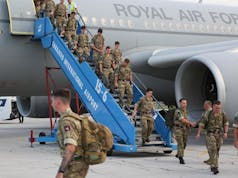Babcock has announced it is to invest in a research and development project to support the future of military driver training.
The firm says that military drivers need to be prepared for a wide range of situations, which can be difficult to replicate, for example, how to respond to a tyre blowout, varying terrains, driving at night or in foreign countries with unknown road signs.
“Babcock has signed an agreement with VRAI, Novatech and Bohemia to investigate how technology can be used to create training environments at scale which are focussed on the user experience, insight intensive and can be used to train quickly, effectively and reach competence at accelerated rates.
Working with SMEs, academia and industry innovation partners, Babcock will explore how simulation and innovative modelling technologies can provide an alternative to traditional training methods, while helping to reduce environmental impact, costs, and deliver training where it is needed.”
Jo Rayson, Managing Director for Babcock’s training business, said:
“There can be many challenges delivering military driver training, including how individuals maintain their skills once qualified, the availability of training platforms, or difficult to replicate operational environments. Babcock is investing in this project to investigate simulation as a realistic way of delivering this essential training capability, driving down costs and reducing the impact traditional training has on the environment. We are not tied to any one solution or approach. We are focused on finding the right answers, using the right technology and harnessing it for greatest impact at the lowest cost.”
Niall Campion, Managing Director for Product & Customers at VRAI, said:
“At VRAI, we believe that data is the untapped resource in simulation training and have developed HEAT to turn this resource into actionable insights. We are delighted to be able to work with Babcock to bring this pioneering technology to driver training. By capturing structured training data, the project team will not only be able to assess individual trainee performance, but also that of the simulator in general, providing objective, actionable insights when considering the potential future impact of the research.”













I did my HGV at Church Crookham , 6 week course passed my test after 5 days solid driving , and then spent the next 5 weeks driving around the south, driving cross country. On return back to my unit, I had to spend a few months attached to the servicing bay to learn basic maintenance, before been allowed out with a driver on runs, where I would drive under supervision. A really good mate of mine was a driving instructor at Deepcut (Ex RLC WO2) and in the end he left as he couldn’t believe the corners they cut regards driver training. In fact, I’ll send him this link and see if he will pass comment.
Ah 56 MT Training Sqn RE 😂 All my courses from basic up to A2 were done there👍.
If they reduce the length of courses it increases the profits . Must have been cheaper when the military had their own unit instructors. Courses could be run at short notice for variable numbers of soldiers as required by the unit. No after dinner speaking in those days!
”..or in foreign countries with unknown road signs.” Wales?
I did 4 postings to Germany. We were issued a BFG ‘Highway Code’ which of course included illustrations of all the German road signs and given a few hours to read it, then did a Matrix test. If you passed you could drive the vehicle you had a license for – military and own car – on the German roads. I think these Babcock guys are making a mountain out of a molehill on that aspect.
Agreed, I had to (as did everybody else) pass the BFG tick test every year. As I can speak and understand German I had no issues. As a PSI I would deploy troops to Germany and before they flew out I had to ensure they passed the very same tick test (done on computer) whilst they weren’t as au fait in German as I was, A few classroom lessons from me on the Sat before they deployed on the Monday with the test on Sunday was enough to get most past the test. In other words not that hard to achieve
Well as they can only drive at 20mph I can see no problem driving with a map on their laps, what could possibly go wrong.
Lol